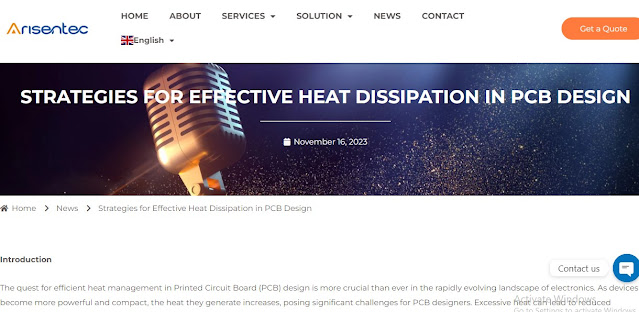Approaches for Effective Heat Dissipation throughout PCB Design
In today's speedily evolving technological landscape, branded circuit boards (PCBs) participate in a pivotal role with powering electronic devices. Whether it's some sort of smartphone, a laptop, or possibly a complex industrial machine, PCBs are at the heart of these innovative developments. However , as electronic elements become more powerful and compact, temperature generation has emerged being a significant concern. Excessive warmth can lead to reduced performance, quicker component lifespans, and even disastrous failures. Therefore , implementing efficient heat dissipation strategies within PCB design is crucial. On this page, we'll explore the top approaches to ensure efficient heat operations in your PCB designs.
1. Component Placement and Format Optimization
The arrangement associated with components on the PCB could greatly impact its energy performance. To optimize high temperature dissipation, consider the following:
1. 1 . Group Heat-Generating Ingredients
Group components that make heat in close area. This minimizes the heat resistance between them, allowing for extremely effective heat transfer.
1 . 2 . not|installment payments on your|minimal payments} Place High-Power Components Near to the PCB's Edge
Position high-power components near the PCB's border to create a shorter heat route to the surroundings. This prevents typically the concentration of heat in the key area.
1 . 3. Preserve Sensitive Components Cool
Make sure sensitive components, such as microcontrollers or memory chips, are put away from heat sources. This kind of prevents overheating and possible malfunctions.
2 . Proper Energy Management Materials
Selecting the right elements for your PCB can drastically impact its thermal functionality. Consider these options:
2 . 1. High Thermal Conductivity Substrates
Opt for substrates with high arctic conductivity, such as ceramic PCBs. These materials efficiently send heat away from components.
2 . 2 . not|installment payments on your|minimal payments} 2 . Copper Planes along with Vias
Incorporate copper aircraft and vias in your PCB design. These act as heating sinks, dissipating heat proficiently throughout the board.
3. Satisfactory Ventilation and Cooling
Combine ventilation and cooling elements to enhance heat dissipation:
3 1 . Heat Sinks
Affix heat sinks to high-power components. These devices increase the area for heat dissipation, preserving temperatures in check.
3. 2 . not|installment payments on your|minimal payments} Fans and Heat Piping
For more demanding applications, contemplate using fans and heat piping. Fans circulate air, when heat pipes transport temperature away from hotspots.
4. Heat Analysis and Simulation
Ahead of finalizing your PCB layout, perform thermal analysis in addition to simulation:
4. 1 . Employ Simulation Software
Utilize ruse software to predict warmth distribution and identify prospective hotspots. This allows for qualified design improvements.
4. 2 . not|installment payments on your|minimal payments} Thermal Testing
Conduct winter testing on prototypes for you to validate your design's effectiveness. Make necessary adjustments based upon real-world data.
5. Standard Maintenance and Monitoring
After your PCB is in functioning, regular maintenance is essential with regard to prolonged functionality:
5. 1. Monitor Temperature
Implement temp sensors to continuously keep an eye on PCB temperatures. This files can trigger automated soothing solutions or alerts regarding maintenance.
5. 2 . Fresh Dust and Debris
Keep PCB and its cooling parts clean to prevent dust as well as debris buildup, which can hinder heat dissipation.
In conclusion, successful heat dissipation in PCB design is paramount in order that the reliability and longevity regarding electronic devices. By carefully arranging component placement, selecting correct materials, and incorporating useful cooling mechanisms, you can boost your PCB's thermal overall performance. Regular monitoring and maintenance further more guarantee the continued productivity of your electronic systems. Carry out these strategies to stay ahead of time in the ever-evolving world of gadgets.
Let's take a check out more details about upon arisentecpcb.com/strategies-for-effective-heat-dissipation-in-pcb-design




Comments
Post a Comment